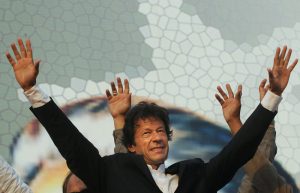As the dust settles, Imran Khan has emerged the undisputed winner of the 2011 Jalsa Wars. Even if you control for the standard variables such as hired bodies and curious onlookers (certain to be much higher in this case), Imran’s crowd was impressive. On the other hand, Altaf’s late entry was little more than a side note, and after being outshone by the crowd at Minar-e-Pakistan, PML-N’s response that “in politics people make the decision through their vote” msuggests that the Sharifs are counting votes more closely than they did on Thursday. Still, despite the impressive showing, many questions remain as we inch closer to 2013.
Speaking to New York Times reporter Salman Masood, Imran explained his political strategy.
“People confuse two types of politics,” Mr. Khan said as he sprawled on a sofa in the house, situated on a hill that overlooks the city. “One is the politics of movement. The other is traditional power-based politics. Tehreek-e-Insaf is never going to win the traditional way.”
I found this somewhat concerning. Not that I think that Imran would be advised to adopt ‘traditional power-based politics’, but the ‘politics of movement’ is not necessarily the politics of solutions. Movements tend to be ideological and reactionary, whereas solutions require consensus and compromise. Rallying against corruption and governing in a society with deeply rooted patronage networks are two entirely different animals. Additionally, some of Imran’s strategy rings not of a new way forward, but an age old prejudice.
“Lahore decides what happens in Punjab,” he said. “Punjab decides what happens in Pakistan.”
Of course, if this were true, Nawaz Sharif might be PM instead of Yousuf Gilani. It turns out that despite this age-old racism, Pakistan is more than just a Punjabi playground. But, speaking in Lahore, it is sure to be a crowd pleaser.
In fact, while the talking points that filled his speech may have been very popular, many of them were also very short-sighted. It’s easy for Imran Khan to say that “Imran will rather die” than ask for foreign aid. But Imran is not the one who will die without foreign aid. Remember, the Sharifs already tried this tactic, and it was the poor of Punjab who suffered for their display of jingoism.
The loss of aid for schools, water and sanitation also won’t be felt acutely by the elite. Most send their children to private schools and live in leafy parts of Lahore dotted with Western restaurant chains, polo grounds and cosmetic surgery centers. The Sharifs own property in London worth millions of dollars.
The Pakistani military, which has received the bulk of US assistance over the past decade, is also somewhat insulated from a reduction in aid. Its officers mostly live on well-manicured cantonments that have their own schools and hospitals that are much better than those available to the general public.
Life is very different for Pakistanis who live in Shamaspura, a dirt-poor part of Lahore filled with ramshackle brick houses separated by a narrow mud lane coursing with sewage. Most of the roughly 15,000 residents are fruit and vegetable vendors who make about $2 per day. They are forced to tie pieces of cloth across their faucets to filter out dirt and insects in the water.
Other promises were mere fantasies without answering the difficult question of how PTI is going to achieve what no other party has been able to.
Mr Khan said a country that had “over 180 billion tons of coal reserves could not in any way be called an energy starved state”. There is an equally great potential in hydro-electric resources.
“If the PTI can run thermal units even at 70 per cent of their installed capacity, currently running at 25 to 30 per cent, the country will have no energy crisis,” he said.
And then there were the promises remind us how unfortunate it is that Imran chooses to put all of his energy into organising against the incumbent parties who, despite their many failings, are not the ones out killing innocent Pakistanis. Lines such as “The minorities should rest assured that the PTI will stand for them once in power”, raise the obvious question – why do they have to wait? Gathering 100,000 people to rally against the government and foreign drones is one thing, but why won’t Imran Khan organise 100,000 people to rally against sectarianism and obscurantism that’s killing people in our own backyard?
As the excitement of Jalsa Wars dies down and people go back to their daily lives, it’s unclear if Imran Khan will be able to translate this frustration into votes, or if he could maintain this momentum once a PTI member was actually responsible for governing rather than merely complaining. Imran Khan has come a long way since the past 15 years, but he has a long way to go before he reaches the political maturity that a successful nation requires.
![]()






